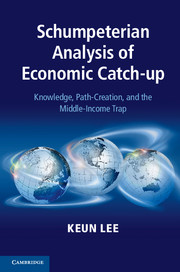Book contents
Foreword
Published online by Cambridge University Press: 05 June 2014
Summary
Foreword
One hundred years ago in 1912 a very young Joseph Schumpeter published an epochal book, The Theory of Economic Development, in which he laid bare the mechanisms through which capitalism expands and renews itself. In the intervening century, the system he described so well has expanded worldwide, and is now drawing in China, India et al. Yet while Schumpeter's emphasis on innovation and creative destruction was entirely correct, his dismissal of follow-up strategies as “mere imitation” has not stood the test of time. First Japan, then Korea and Taiwan, and now China are all pursuing highly sophisticated strategies of resource leverage and knowledge appropriation that have enabled them to catch up with the industrial leaders (in the cases of Korea and Taiwan) or to be well embarked on the process, in China's case.
One hundred years later, Keun Lee finally provides a clear account of just how they are doing it. His book draws from his own and colleagues' empirical investigations of Korea's catch-up strategies, and engages with the wider literature on industrial and competitive dynamics. The book presents a sustained and original analysis of the catch-up processes pursued by Korea and Taiwan (with a discussion extended to China) demonstrating – using patent data and analysis – that successful catch-up involves strong attention to targeted knowledge capture and build-up of broad capabilities. Keun Lee demonstrates that countries that catch up do so by targeting specific technologies that are characterized by what he calls short cycle times – meaning that they have a high rate of product and process turnover (as measured in terms of patenting rates). Using the examples of Korea and Taiwan, Keun Lee shows how the two countries acquired their initial technological capabilities for the decade 1975 to 1985 in technologies such as automotives, steel, and chemicals (of lengthening cycle times) but passed their first transition, or turning point, in the mid 1980s when they started systematically targeting technologies with shorter cycle times (electronics, semiconductors, flat panel displays, IT) which required them to build broad capabilities in these fast-moving technologies.
- Type
- Chapter
- Information
- Schumpeterian Analysis of Economic Catch-upKnowledge, Path-Creation, and the Middle-Income Trap, pp. xiii - xviPublisher: Cambridge University PressPrint publication year: 2013



